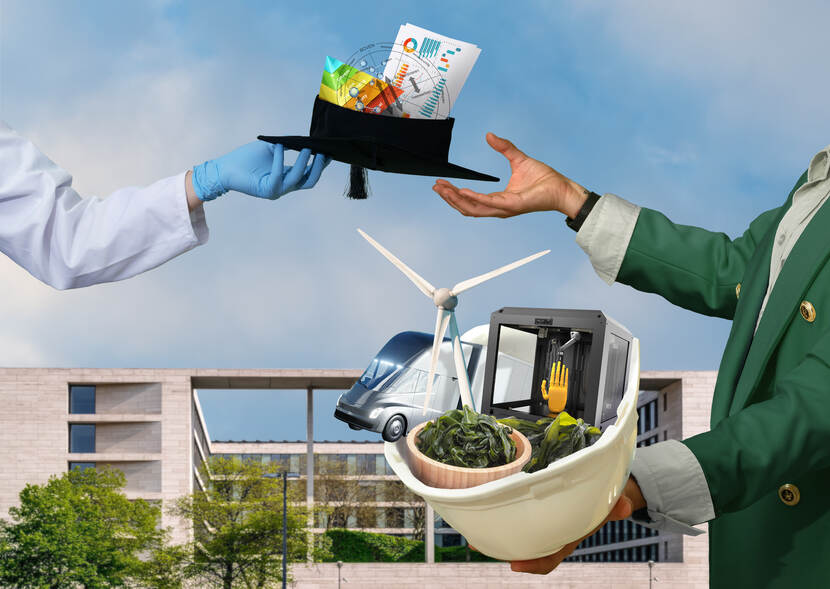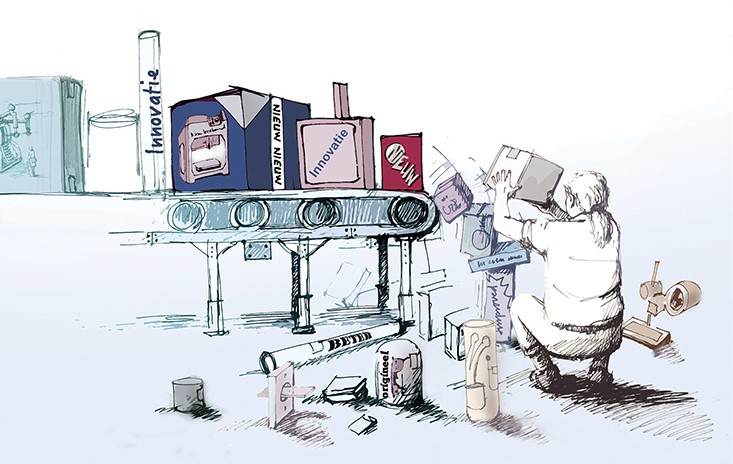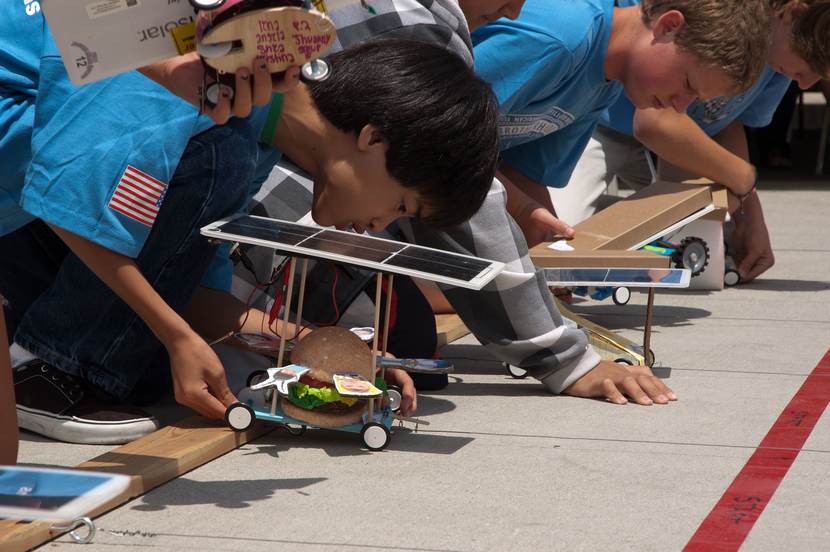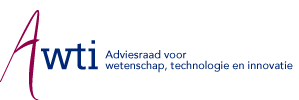The Advisory council for science, technology and innovation (AWTI) advises the Dutch government and parliament on policy in the areas of scientific research, technological development and innovation.
On this web page you will find publications from 2014 onwards. Publications published between 2000 and 2013 can be found in the AWTI website archive.
If you are looking for a specific publication and you cannot find it in the AWTI website archive, please contact the AWTI on telephone number +31 (0)70 3110920. Or send an
e-mail to secretariaat@awti.nl.
Publications
-
2024
-

In order to increase our national security, educational and knowledge institutions and the Ministry of Defence must work together more and more closely. The Advisory Council for Science, Technology and Innovation (AWTI) concludes this in its new advisory report: 'Knowledge offensive for defence - Research and innovation for a secure Netherlands'. The AWTI advises mobilizing knowledge as broadly as possible regarding defence research and innovation. The advice contains recommendations for the government and knowledge institutions.
Read the advisory report: Knowledge offensive for defence - Research and innovation for a secure Netherlands
-

When tackling social issues, too little use is made of social science and humanities (SSH) knowledge. This is what the Advisory Council for Science, Technology and Innovation (AWTI) notes in the advisory report 'Natural connection. Anchor SSH research in innovation'. The advice contains recommendations for government and scientists.
Read the advisory report: Natural connections - Embed social sciences and humanities research in innovation
-
-
2023
-
The ambitions that the Netherlands has in the areas of housing, healthcare, climate and agriculture cannot be achieved within the current system. Innovation policy must focus more on what will be needed in the future and no longer reinforce what already exists. This is stated by the Advisory council for science, technology and innovation (AWTI) in its advice.
The Dutch are becoming increasingly aware of the urgent need to tackle major societal challenges in the areas of climate, food, energy, mobility and healthcare. We need innovative solutions for these major societal challenges. These solutions are not only technical in nature and will not simply materialise unaided; they will demand radical changes in Dutch society: so-called 'transformations'.
Read the advisory report: Shaping the future - From optimisation to transformation.
-

Science, technology and innovation (STI) are crucial for the development of the EU and the Netherlands: for the development of the EU and the Netherlands as a knowledge economy and because of the many social challenges we face. The EU therefore makes policy to promote STI, just as the Netherlands does. At the request of the government, the Advisory Council for Science, Technology and Innovation (AWTI) advised on the question: 'How do we ensure that European and Dutch STI policies are better aligned and reinforced?'
Read the advisory report: Strategic interplay - Combine the strengths of the Netherlands and the EU for greater research and innovation impact
-
-
2022
-

The combination of geopolitical, technological, and societal trends is making international collaboration between knowledge institutes increasingly complex. The rewards are many, but there are risks, too. Governments and knowledge institutes have taken a number of steps in recent years to mitigate these risks. While these steps have been useful, the rapid pace of developments constantly throws up new challenges. Therefore, the AWTI identifies a need for a learning approach, with ongoing attention for nuance and more awareness-raising.
Read the advisory report: Knowledge in Conflict - Striking a Balance between Security and Liberty.
-

Interdisciplinarity is crucial in research. It leads to scientific breakthroughs and opens the way for solutions to complex societal problems. Given its strong starting position, the Netherlands could set an example in Europe in helping to forge a more effective policy on interdisciplinary research in the Netherlands and beyond. To explore this, the Dutch Minister of Education, Culture and Science put the following question to the Advisory Council for Science, Technology and Innovation (AWTI): How can the government encourage and facilitate interdisciplinary research more effectively, given the current challenges facing society?
Read the advisory report: Unbounded research - Promoting interdisciplinarity through two distinctive government roles.
-
-
2021
-

New knowledge is vital to keep the economy healthy and resolve societal challenges. Key here is that businesses can benefit from the knowledge developed by knowledge institutes. Whilst that does happen at present, it is not yet optimal. The government would therefore do well to take specific measures to strengthen the links between researchers and entrepreneurs, enabling opportunities to be grasped from a basis of knowledge.
Read the advisory report and summary: Seizing opportunities with knowledge - Strengthening the links between researchers and entrepreneurs.
-

The Netherlands is facing a period of major transitions towards a green, sustainable, digital and inclusive economy. Innovation plays a crucial role in this process. Innovation takes place in the regions, where businesses, scientists, talent and civil-society organisations come together to create inspiring initiatives and opportunities for innovation.
Read the advisory report: Raising the bar together - Regional and central government working together for innovation.
-
State of knowledge - Restoring the value of knowledge and expertise in policy and politicsApril 2021


The Netherlands is a country rich in knowledge, but there are challenges in ensuring that government policy is always properly informed by that knowledge. As a result, the Netherlands is missing out on opportunities to make policy more effective and improve its public services. Although the government has taken some steps on the path to better embedding of knowledge, much more needs to be done. That is the subject of this report.
Read the advisory report: State of knowledge - Restoring the value of knowledge and expertise in policy and politics.
-
-
2020
-

The climate for start-ups in the Netherlands has improved in recent years, but the growth of knowledge-intensive start-ups after the initial phase falters, especially compared with other countries such as the US, UK or Israel. Upon request of the Dutch parliament, AWTI analysed why too few knowledge-intensive start-ups progress to become scale-ups and advises what can be done to improve the growth of knowledge-intensive start-ups.
Read the advisory report: A better start - The key to growth of knowledge-intensive start-ups.
-

The Netherlands is a prosperous country with a flourishing economy. However, as a nation we face a number of urgent societal challenges in areas such as food, healthcare, mobility, safety and sustainability. Goal-oriented societal transitions are urgently needed on these and other fronts, and have to some extent already been initiated. Science, technology and innovation (STI) could play a stronger, more effective role in this process. That is the subject of this report.
Read the advisory report: Strengthen the role of science, technology and innovation in societal transitions. -

Key technologies deliver ground-breaking innovations which help progress on all fronts. They lead to better medical care, cleaner transport and more efficient and cleaner production. Key technologies thus have a major and unassailable impact on science, society and the economy. However, their development also raises questions and concerns, for example in relation to safety and privacy.
Read the advisory report: A more forceful choice for key technologies.
-
-
2019
-

Global competition in higher education and research is growing. New developments impose ever-changing demands on workers and offer opportunities for a major shake-up of education and research. Student numbers have increased sharply and the system is becoming overloaded. Is the Dutch higher education and research system adequately prepared for the future? What do all these developments require of Dutch universities (universiteiten) and universities of applied sciences (hogescholen)?
Read the advisory report: Shaking-up the system - Towards a future-proof higher education and research system.
-
-
2018
-

The Netherlands has a long tradition of innovation; past innovations have made a visible contribution to the wealth of the country; and today one of the great strengths of the Dutch is still the ability to develop new products, services and processes. In order to be of genuine value for the economy and society, however, innovations must also be able to spread readily and widely, so they can be used by lots of people and organisations. That is the focus of this report.
Read the advisory report: Spread of innovation - The underexposed side of innovation policy.
-

India is an emerging global power. It has a relatively young and growing population of 1.3
billion, equivalent to 18% of the total world population. India is the biggest democracy in
the world, located in a region marked by tensions. Consequently, it is a country which
occupies a key geopolitical position.Read the advisory letter: Focus on India - Advisory Letter on Dutch-Indian Collaboration in Science, Technology and Innovation.
-
-
2017
-

Applied research is concerned with finding solutions to practical problems and issues confronting society. It is essential for strengthening the innovative capacity of industry, for tackling challenges relating to social renewal and for improving the quality of government policy.
Read de summary of the advisory report: Vital links - The future of applied research.
-

The Netherlands is losing ground to its neighbours in its support of the internationalisation of science, technology and innovation (‘STI diplomacy’). This will hamper the competitiveness of the Netherlands, as it will become more difficult to attract and retain talent, while R&D will more and more shift to other countries. Therefore, in its advisory report “STI Diplomacy”, AWTI calls upon the Dutch government to strengthen its STI diplomacy by establishing a clear strategy and expanding the instruments and available budget.
Read the advisory report: STI Diplomacy - Advancing the internationalisation of Science, Technology and Innovation.
-
-
2016
-

The time is ripe for substantial extra investments in research and innovation. Extra investments are essential for the future of the Netherlands and for its international position as a leader in innovation and a centre for top research.
Read de summary of the advisory report: Maintain the basics - Priorities for extra investments in research and innovation.
-

In its energy policy, the Dutch government must give greater focus to innovation. In particular, breakthrough innovations should be supported via a mission-oriented approach. This is crucial for achieving the transition to a sustainable energy supply.
Read the summary of the advisory report: Grasp the challenge - Daring to go for energy innovation.
-

Status of the Dutch Top Sectors policy for research and innovation in 2016.
Read the summary of the advisory report: Flexibility, differentiation, sharper choices - Status of the Dutch Top Sectors policy for research and innovation in 2016.
-

Knowledge absorptive capacity is the ability to identify, assimilate and utilise relevant knowledge. It enables research institutes to generate new knowledge and businesses to innovate.
Read the summary of the advisory report: Capturing, processing and valorizing knowledge.
-

This advisory report is about open science, and more specifically about access to scholarly publications (open access) and research data (open research data). What impact is this likely to have for the world of science itself, for society and for business? What level of openness is publicly desirable and what does this imply for government policy?
Read the advisory report: Dare to share - Open access and data sharing in science.
-
-
2015
-

All technological developments that matter, are depending on ICT. ICT changes the character of our economy, our work and our lives. Without ICT there is no knowledge society. Yet, the great importance of ICT receives too little attention from policymakers.
Read the advisory report: Ready for the Future? Towards a broad ICT strategy.
-

This study describes aspects of Brazil’s knowledge and innovation system that affect Dutch-Brazilian cooperation in the field of research, technology and innovation. Extra attention is given to Brazilian-Dutch cooperation in the sectors: agriculture, biomass; water, life sciences (health care) and aeronautics. This selection is by no means a complete overview but rather intended as a first impression of the possibilities for Dutch-Brazilian cooperation.
Read the advisory report: Collaborate to innovate - Knowledge and Innovation Cooperation between Brazil and the Netherlands.
-

In this report the Advisory Council for Science, Technology and Innovation (AWTI) addresses the question of how policy can help ensure that the relationship between teaching and research in Dutch higher education makes a strong(er) contribution to the quality of both teaching and research and to the future prospects of students.
Read the summary of the advisory report: The relationship between teaching and research in higher education - Unity in diversity.
-

In this report, the Council addresses the question how SMEs and universities of applied sciences can improve their knowledge partnerships.
Read the summary of the advisory report: SMEs and Universities of Applied Sciences - Partners in innovation.
-
-
2014
-

In this report the Advisory council for science, technology and innovation (AWTI) indicates ways in which Dutch central and regional government can support regional hotspots for innovation and thus help increase their prosperity.
Read the summary of the advisory report: Regional innovation hotspots.
-

The purpose of this status report is to provide input for effective adjustments to the top sector policy.
Read the summary of the advisory report: Status of the top sectors in 2014.
-

Dutch public research institutes and public research funders have far-reaching freedom in determining their research policy. The inter-relationships between the autonomous Dutch research institutes are marked by a mix of maintaining a distance at the institutional level, competing for staff, students and resources at the faculty and discipline level, and collaboration. In recent years, the national government has restricted itself to developing preconditions and funding without a great deal of steering.
Read the summary of the advisory report: Standing out from the crowd.
-

The Council adviced the Dutch government on how to increase the innovative and growth capacity of SMEs. The Council adviced to focus specifically on so-called 'growth-drivers': companies with the ambition and potential to innovate and grow. For these companies, effective ecosystems are essential.
Read the summary of the advisory report: Growth-drivers.
-

AWT sees social innovation as a collective term for contemporary initiatives by people and organizations focussed on devising innovative solutions to societal problems. Interest in social innovation is growing worldwide and expectations are high. The AWT was asked for advice: What exactly does social innovation mean, and does the government have a role to play in this regard?
Read the summary of the advisory report: The power of social innovation.
-





























